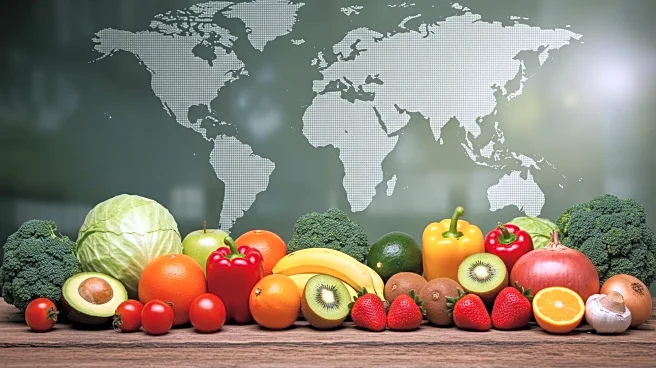What is the story about?
What's Happening?
The South African agriculture sector is facing significant challenges due to U.S.-imposed tariffs averaging 30 percent, as stated by Mooketsa Ramasodi, director-general of the South African Department of Agriculture. These tariffs, part of President Trump's executive order on July 31, are part of the 'reciprocal tariffs' policy affecting multiple countries, including South Africa. The increased tariffs are squeezing the incomes of South African farmers and threatening employment in agriculture and related sectors. The agriculture sector is crucial for South Africa, contributing 3 percent to the GDP and 5.8 percent to general employment. The tariffs particularly impact exports of citrus and wines, potentially forcing small and medium-sized farmers out of export markets and exacerbating rural poverty. The South African government is negotiating with the U.S. for more reasonable tariff rates and is also exploring trade diversification strategies to mitigate the impact.
Why It's Important?
The imposition of high tariffs by the U.S. on South African agricultural products highlights the vulnerabilities of economies heavily reliant on unilateral trade relationships. For South Africa, the agriculture sector is not only a significant contributor to the national GDP but also a vital source of employment. The tariffs threaten to destabilize this sector, potentially leading to increased rural poverty and economic instability. The situation underscores the importance of trade diversification for South Africa to reduce dependency on the U.S. market and to safeguard its economic interests. By seeking new trade partnerships with countries like China, Japan, and South Korea, South Africa aims to create a more resilient economic framework that can withstand such external shocks.
What's Next?
The South African government is actively pursuing negotiations with the U.S. to achieve more favorable tariff conditions. Concurrently, it is accelerating efforts to diversify its trade partnerships, focusing on expanding cooperation with Asian markets. This strategic shift aims to open new markets for South African agricultural products, thereby reducing the adverse effects of the U.S. tariffs. The success of these initiatives will be crucial in determining the future stability and growth of South Africa's agriculture sector. Stakeholders, including farmers and trade officials, will be closely monitoring the outcomes of these negotiations and diversification efforts.















